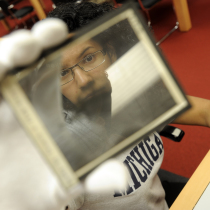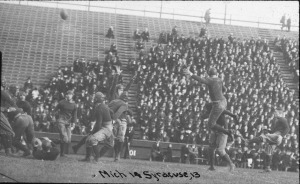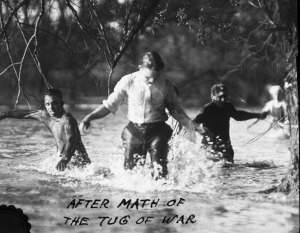Magazine

Slide Over Here
A new old way to see U-M
By Melissa Hernández-Durán
Before PowerPoint presentations, before the development of overhead projectors and transparencies, even before 35mm film, there was the lantern slide.
Invented in 1849, just ten years after the advent of photography, lantern slides were used to project a photographic image onto a surface, thereby enabling a group of people, not just an individual, to view a single image. The photographic image was imprinted on a light sensitive glass slide, covered with another slide, and then sealed together with tape around the edges.
Hundreds of these unique and fragile glass transparencies are part of the Bentley’s collections, and the 3 ¼ x 4 glass slides depict a range of scenes: student life, an early University of Michigan campus, scientific research, advertisements and entertainment.
A number of the slides showcase campus buildings no longer standing, such as University Hall, a structure built in the 1840s, which served all three of the University’s departments at the time. University Hall had an auditorium, a chapel, office space for the three departments, and lecture halls.
The slides also document University research. The Detroit Observatory captured images of Halley’s Comet during its 1910 passage. And the Department of Physics captured cyclotron research (particle acceleration) at the University.
The slides highlight other aspects of university history, including campus traditions and student life. The records of the Michigan Union contain examples such as the first-year versus sophomore tug-of-war across the Huron River and early football games. Even faculty members are documented through caricatures in additional slides from the Wilfred B. Shaw photograph collection.


These unique images can be viewed either in their original or digital form, however the library also has the capacity to recreate the original experience. In a recent accession from the Department of Physics, the Bentley acquired a lantern slide projector. Two slides fit within a wooden frame, which is then inserted into a space between the light source and the projecting lens. The image doesn’t project very far, but it’s an early example of photo sharing, long before Flickr and Instagram.
